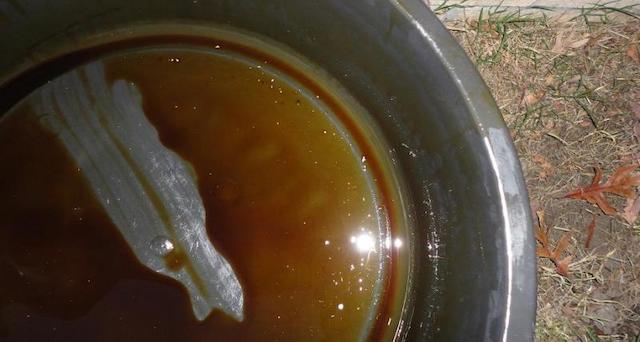Last Updated on February 13, 2023 by Ryan
There is no definitive answer to this question as it depends on the type of metal and the concentration of metal in the oil. Some metals are more harmful than others, and some concentrations of metal may be more harmful than others. However, if there is a high concentration of metal in the oil, it is likely that it will cause damage to the engine over time.
When it comes to metal in oil, there is no “one size fits all” answer. The amount of metal that is considered “too much” will vary depending on the type of oil being used and the application in which it is being used. For example, engine oils typically have higher levels of metals than hydraulic oils.
That said, there are some general guidelines that can be followed when determining if there is too much metal in your oil. One indication that there may be too much metal in your oil is if it has a metallic smell or appearance. Another indication may be if your oil pressure drops suddenly or if you notice increased wear on engine parts.
If you suspect that there may be too much metal in your oil, it is important to have it checked by a professional as soon as possible. Too much metal in your oil can cause serious damage to your engine and other parts of your vehicle.
Post-Rebuild Oil Change: Found Some Metal Flakes In The Oil Filter! Is Our Engine Toast?
Metal Shavings in Oil And Knocking
If you have a car, chances are you’ve had to deal with metal shavings in oil and knocking. It’s one of the most common issues that car owners face, and it can be a real pain to deal with. Here’s everything you need to know about metal shavings in oil and knocking, so you can fix the problem quickly and get back on the road.
What are Metal Shavings in Oil?
Metal shavings in oil are small pieces of metal that have been shaved off of engine parts. These shavings can come from anywhere in the engine, but they’re most commonly found in the valvetrain or piston area.
Over time, these shavings will build up in your oil and cause serious problems for your engine.
Why Are Metal Shavings Bad for Your Engine?
As metal shavings build up in your oil, they will start to clog up vital engine parts.
This can lead to a loss of power, increased wear on engine parts, and eventually engine failure. In addition, metal shavings can also cause knocking noises as they bang around inside your engine. If you notice any strange noises coming from your engine, it’s important to check for metal shavings right away.
How Do You Fix Metal Shaving Problems?
If you find metal shavings in your oil, there’s only one thing you can do: replace your oil immediately. This will remove all of the metal shavings from your system and protect your engine from further damage.
Be sure to use fresh, high-quality oil when performing this change – cheap oils may not provide enough protection against metal shards.
Metal in Oil After Break in
If you’ve just had your engine rebuilt, or are simply changing your oil for the first time after breaking in a new car, you may have noticed some metal shavings in the oil pan. While it’s normal to see some metal flakes after a break-in period, too much can be cause for concern. In this blog post, we’ll take a look at what causes metal in oil after break-in and how to tell if there’s cause for alarm.
When an engine is first assembled, the various moving parts will have sharp edges from the machining process. These need to be broken down and rounded off before the engine can run smoothly. This is accomplished by running the engine at high speeds under load for a period of time – typically around 500 miles.
During this break-in period, it’s normal to see some increase in wear as the parts start to mesh together. This can manifest as small metal shavings in your oil pan. If you notice an abnormal amount of metal in your oil after break-in, though, it could be indicative of a problem with your engine.
Excessive wear on piston rings or bearings can lead to increasedmetal contamination of your oil. If you think this may be the case, consult with a qualified mechanic who can diagnose and fix the problem before it leads to more serious damage down the road.
Metal Glitter in Oil
If you’re a fan of all things sparkly, then you’ll love using metal glitter in oil. This type of glitter is perfect for adding a touch of glamour to any project. Here’s what you need to know about using metal glitter in oil:
Metal glitter is available in a variety of sizes and shapes. You can find it at most craft stores.
To use metal glitter in oil, simply add a small amount of glue to your project and then sprinkle the glitter over top.
The glue will help the glitter adhere to your project.
Be sure to seal your project with a clear sealer once you’re finished adding the glitter. This will help prevent the glitter from falling off over time.
Putting Metal Shavings in Car Oil
If you’re a car enthusiast, you may have heard of the practice of putting metal shavings in car oil. This is done to help improve the performance of the engine and protect it from wear and tear. Metal shavings act as a lubricant and can help to reduce friction between moving parts.
There are a few different ways that you can put metal shavings in your car oil. One method is to simply add them to the oil before you pour it into the engine. Another way is to use an additive that contains metal shavings.
Additives are available at most auto parts stores.
If you’re going to add metal shavings to your car oil, be sure to use a high-quality product. Cheap products may not provide the same benefits as more expensive ones.
Also, be sure to follow the manufacturer’s instructions carefully. Adding too much or too little metal shaving can cause problems with your engine’s performance.

Credit: www.gopurepower.com
Is It Normal to Have a Little Bit of Metal in Oil?
Yes, it is normal to have a little bit of metal in oil. This is because the metal is used to lubricate the engine and protect it from wear and tear. Over time, the metal can build up in the oil and cause it to become less effective at lubricating the engine.
If you notice that your oil looks darker than usual or has a metallic smell, then you may need to change it more frequently.
What Do You Do If You Find Metal in Your Oil?
If you find metal in your oil, the best thing to do is to take it to a mechanic and have them check it out. Metal in oil can be caused by many things, such as a faulty engine part or simply old age. A mechanic will be able to tell you what the cause is and how to fix it.
Will Aluminum Shavings Hurt My Engine?
If you’re asking whether aluminum shavings from, say, a machined engine part can harm your engine if they get into the oil system, the answer is no. The aluminum will quickly settle out of the oil and won’t circulate through the engine.
But if large pieces of aluminum get into the combustion chamber, it could cause problems.
Aluminum is much softer than iron or steel, so it can deform under the high temperatures and pressures inside an engine. That deformity can cause pre-ignition that’ll damage piston crowns and cylinder heads.
Are There Metals in Motor Oil?
There are a variety of metals found in motor oil, but the most common are iron and zinc. Both of these metals are essential to the proper function of your engine, and they can be found in most types of motor oil. Other metals that may be present in your motor oil include lead, copper, and aluminum.
These metals help protect your engine from wear and tear, and they can also improve its efficiency.
Conclusion
Oil and metal don’t mix, but a new study has found that there’s more metal in oil than we thought. The study, published in the journal Science Advances, found that metals like iron and manganese can end up in crude oil during the process of extraction.
The research was prompted by the Deepwater Horizon spill in 2010, when a rig exploded and released millions of barrels of oil into the Gulf of Mexico.
Scientists found elevated levels of metals in the water near the spill site, but they didn’t know if those metals came from the oil itself or from other sources.
To find out, the researchers analyzed samples of crude oil from around the world. They found that all oils contain trace amounts of metals, but those from deep-sea drilling sites like Deepwater Horizon contained higher levels of iron and manganese.
The study’s authors say that more research is needed to understand how these metals affect oil extraction and refining, but they believe that their findings could help improve safety procedures for offshore drilling.



